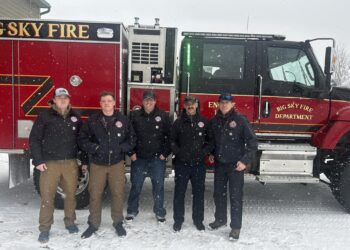A baptism of fire
By Jessica Kilroy, Explorebigsky.com Contributor
The earth drops away. The only thing between me and the ground is the
fuselage of a Bell 205 chopper. I feel calm.
The chaos and urgency of responding to a wildfire has a quieting effect on me.
I’m not alone. Flying low, our pilot, a Vietnam veteran, wears a coy, mischievous
grin, silent amidst the constant radio chatter and powerful drone of rotors. Navigating
with skill and ease, he holds steady as we approach a vast granite wall looming
hundreds of feet into Idaho’s blue sky.
He pretends to lose control of the helicopter for a moment. Eyes fixed on the horizon,
my squad boss and captain are unimpressed by his antics. This isn’t our first rodeo.
Realizing he isn’t dealing with a crew of greenhorns, the prankster pilot regains
his composure, pulling the chopper up and over the craggy monolith, chuckling as he
clears the top by mere feet.
My crew, the Panhandle Hotshots, has been called to assist the Missoula Smokejumpers
in containing a lightning strike that’s gotten out of control: one hotshot
crew, four jumpers, hundreds of acres ablaze. We have our work cut out for us.

We descend into an open valley and find ourselves deep in the Frank Church-River
of No Return Wilderness. No roads, no trails, this country is ruled by no man. Surrounded
by steep mountains, the lush valley below is protected by peaks rugged and
forlorn—ancient warriors ordained to guard sacred ground, steadfast and loyal.
Black billows rise above the blaze high on a mountainside. It appears to be rapidly
increasing in size and intensity.
We approach the narrow ridge and hover over a makeshift
helipad, one helicopter skid in the air, one touching down.
Carefully we exit the chopper onto the structure of teetering
logs and unstable rocks hastily constructed by the smokejumpers,
and make our way down toward the safety zone where the
rest of the crew awaits the plan of attack.
After a short briefing with the jumpers, we hike together
down steep, treacherous terrain, staying close to prevent
rockfall from gaining momentum and causing injury. After 40
minutes we reach the bottom of the fire and begin digging a
cup-trench, a tried and true method that catches rolling embers
from above.
“Rock!”
My co-workers shout warnings as various sized boulders
dislodge beneath quickly disappearing vegetation and pound
down the slope from above. With each near miss, I’m surprised
to hear myself let out primitive yelps of fear.
The air is thick with smoke and dust, causing the inevitable
“dirt tooth” anomaly, a most uncomfortable situation where
dust, ash and grime cake onto teeth exposed inside a firefighter’s
wide open panting mouth. The heat from flames only
feet away grows to an almost unbearable temperature. Cutting,
swamping, digging, dodging, soaked in sweat, slipping down
the steep mountainside, we’re losing the battle against Mother
Nature.
Twenty hours, no food, no rest.
Suddenly our dulled senses are heightened as the freight train
roar of a crowning fire threatens from above. Radio traffic
explodes, and all crew members are ordered to retreat to the
safety zone.
I fight against the 40-degree slope. Sucking smoke, scrambling
to reach safety, we run for our lives. Helping each other up
after each fall, we push across the mountain with shouts of
encouragement barely audible over the thunderous firestorm.
The night sky lights up as if the sun is rising, and the rumble
of the devouring inferno is deafening.
I reach the safety zone. Gasping for air, I frantically dig a shallow
hole in the ground with my combi tool and shove my face
in the dirt. I can breathe now, but still feel the heat of flames
only yards away. I feel sick and dizzy from heavy smoke inhalation,
and hear several of my crewmembers vomiting. We shout
out our last names to make sure everyone’s
accounted for, and I’m relieved to hear all
20 names between intermittent gasping
and coughing.
I know what I signed up for. I’ve accepted
the risks involved in my choice of profession.
With a father who spent 30 years
fighting fire with the Forest Service, I
grew up well versed in the ways of wildland fire. But this is a wake up call, and I
find myself questioning the point of interfering
with nature’s course any further.
With our meager tools and feeble methods,
we are no match for Mother Nature.
After what feels like ages, the fire burns
out. With dawn on the horizon, we hike
down the ridge to make camp, whipped
and weary. Earlier the previous day we got
a call that the helicopter slingload carrying our red bags (sleeping bags, tents and
bottled water) had malfunctioned and detached our gear
from the line, dropping it deep in the wilderness down
the River of No Return many miles away. We’re going to
have to survive with just the contents of our work packs.
After building beds out of pine boughs, we huddle
around a small campfire. With water drawn and purified
from the nearby creek, we crack open our emergency
Army MREs (Meals Ready to Eat), wrap ourselves in our
space blankets and settle in for a few hours of rest.
As I move in and out of consciousness, I spin through
scenarios and possible outcomes of the day’s events.
Too many close calls this time, and we still have another 13 days to go. My mind flickers back and f orth
between good times and haunting memories across six
seasons of fire.
A wild red sun rise after working through the night.
Searching for missing bodies of fellow firefighters and
close friends on the Stanza fire. Inside jokes that keep
us smiling through tough times. Lifeflight helicopters
bringing crewmembers to the emergency room. A tattered, ash-covered crewmate carrying a frightened doe
to safety after a rogue rescue mission. Suffocating in the
safety zone. Moments beautiful and tragic.
I imagine lost crewmates disappearing into the great blue beyond,
like our red bags floating down the River of No Return.
I think about the wild current, and dream of the refreshing
sensation of moving with it, rather than against it.

This is my last year on the fireline. I long to spend time in the
world’s wild places, to marvel at the magnificence of nature
rather than fighting against her.
A crewmate once told me, “you can never return. Once you go
forward, you will never return.” I think I finally understand
what he meant.
I drift off to sleep, and the earth drops away. The only thing
between me and the ground is the river. I feel calm.
Jessica Kilroy grew up in Driggs, Idaho and Eureka, Montana.
Since quitting fire, she’s become a full time musician, touring in
the U.S. and Europe. Her new album comes out this summer.
Find this, and more of her music at jessicakilroy.com and
pterodactylplains.com
This story was originally published in the Summer 2012 edition of Mountain Outlaw magazine. Read more here.










